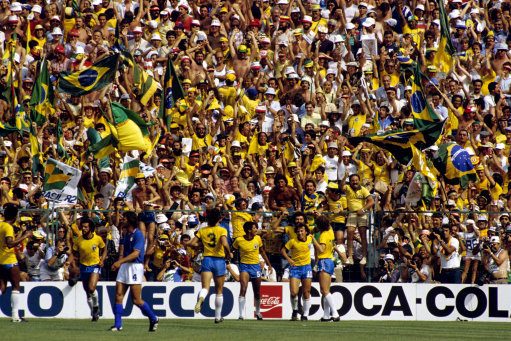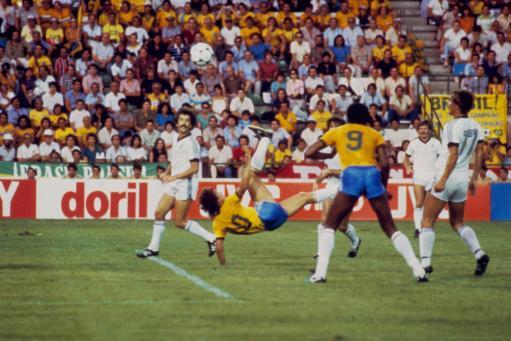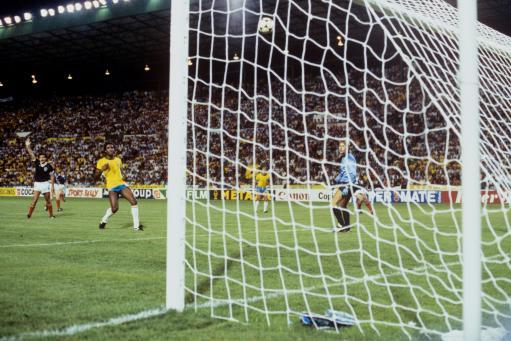Why we loved them
IF ‘JOGO BONITO’ was established by the Brazilian World Cup-winning side of 1970, the team that Tele Santana assembled twelve years later cultivated it.
The players loved the ball and the ball loved them back. Every touch was a caress. Every pass was played with such delicate precision.
And then there was the colour. The team’s style was complemented by the vibrancy of the shirts, the fans, the energy. Like their immortal comrades a dozen years before, the team played in technicolour.
Then there were the players. A roll-call of magicians, capable of changing games with a quick flick. They performed with a natural swagger. Even their pre-match warm-ups proved entertaining – the hips shaking, the shoulders rolling.
Their names hinted at greatness. Socrates. Eder.
Along with the Dutch in 1974, they were the greatest team never to win a World Cup.
The story
Drawn in Group F, Brazil began the tournament with a clash against the Soviets. They went behind after 33 minutes and seemed set to lose until Socrates popped up with a stunning equaliser with twenty-five minutes left.
Cutting inside two challenges, he unleashed a thunderous strike from distance that crashed in off the underside of the bar.
But Brazil saved the best for later. With just two minutes of normal time remaining, Paolo Isidoro popped up on the right side of the area and looked for Falcao inside. As the ball was rolled into his path, the midfielder stepped over it. Eder came charging through and with one touch, he flicked the ball up. With his second touch, he smacked a left-foot volley straight inside Rinat Dasaev’s near post.
The keeper didn’t move, the net was almost torn apart with the ferocity of the strike, and Brazil moved on.
Next up was a 4-1 demolition of Scotland while they finished their group campaign with a 4-0 thrashing of New Zealand.
In three games, they had scored ten goals. But, as was the norm in 1982, the top two sides in each group progressed to another three-team group with the winners of that qualifying for the semi-finals.
Brazil were drawn to face Argentina and Italy and after an irresistible 3-1 win over their fellow South Americans, it all came down to a head-to-head with a struggling Azzurri.
The Italians had scored just four goals in four games and Paolo Rossi had failed to find the net. They had barely scraped through the initial group stage – their two goals still better than the solitary one Cameroon managed and proved sufficient for them to progress on goal difference.
But Brazil’s openness would prove their undoing. A draw against Italy and they would’ve gone through on account of their better goal difference. But, that wasn’t in their DNA.
They were behind after just five minutes as Rossi grabbed his first of the tournament. But back they came with Socrates streaking forward to drive home an equaliser. Rossi grabbed his brace after twenty-five minutes and Brazil always seemed destined to chase the game. With just over twenty minutes to go, Falcao levelled affairs again but within minutes, Rossi had claimed a hat-trick and a semi-final place for his team.
Zico would later say that it was the day that football died.
Stand-out player
Although Socrates was the team’s captain, Zico was its play-maker. In Spain, he scored four goals and set up another four.
But it wasn’t about the frequency of his involvement, it was about the beauty of what he contributed. He didn’t just score goals. He scored immaculate, scarcely-believable goals. His free-kick against Scotland, his scissors-kick against New Zealand.
He didn’t just make passes. He made art. His through-ball for Junior’s goal against Argentina was a thing of remarkable beauty.
Subtle, poised, perfect. Just like the man himself.
Stand-out moment
Something akin to picking your favourite child. Can we choose all of them?
Socrates’ impudent back-heel against New Zealand, Zico’s stunning free-kick against Scotland, the head-tennis to tee-up Falcao’s blistering volley against Argentina that narrowly fizzed over, Eder’s audacious free-kick that thundered back off the underside of the bar against the same opposition, Junior’s flicks and tricks – from full-back, Zico’s pass for Junior’s goal against Argentina.
Every time this Brazilian side played, fans were assured of at least a couple of special moments. Those moments usually ended in a goal.
And so, to our stand-out moment (fanfare, please).
Almost inexplicably, Brazil trailed Scotland after 18 minutes of their Group F clash. In many ways, the opening goal was very ‘Brazil ’82′. Graeme Souness clipped a ball to John Wark on the edge of the area, the knock-down was picked up by David Narey who unleashed a Zico-esque finish with the outside of his right foot which arrowed to the top corner.
Scotland, so used to a Highland fling, had found their Samba beat.
But, Brazil saw the effort and raised it. On 33 minutes, Zico sent an unerring, exquisite free-kick flying past Alan Rough to equalise.
Shortly after the break, Santana’s side took the lead with Oscar nodding home Junior’s in-swinging corner. But after 64 minutes, Brazil conjured a sweeping move.
In the space of three passes, they went from the edge of their own box to the edge of Scotland’s. Falcao dropped deep to pick the ball up from goalkeeper Waldir Peres. He spotted Zico, unmarked in the centre-circle.
The Scots still had five men behind the ball but the magical attacker fed the much-maligned Serginho (described later by Alan Hansen as ‘a big lump who couldn’t run’). The big lump allowed the ball run across his body and easily rolled his marker.
He pushed it through the legs of another defender and from nowhere, Eder appeared on the left of the area. As Rough came off his line to try and narrow the angle, the winger nonchalantly chipped it over his head and floated it to the far corner.
The goal wrapped up the game for Brazil (Falcao would score a fourth late on) and it made millions fall in love with them.
We’re still in love with them.



